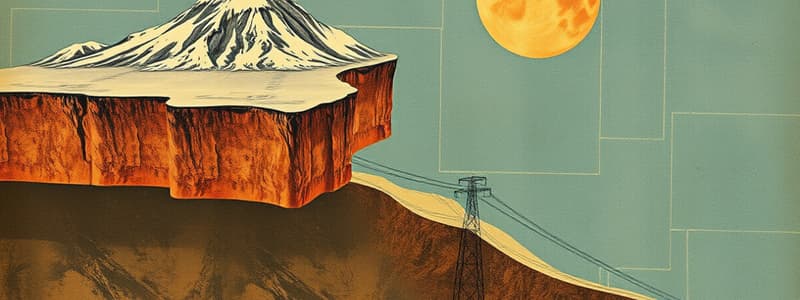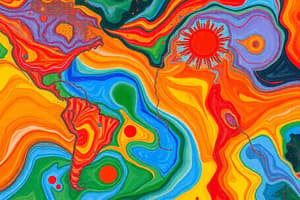Podcast
Questions and Answers
What is the main characteristic of divergent plate boundaries?
What is the main characteristic of divergent plate boundaries?
- They move toward each other.
- They move away from each other. (correct)
- They create trenches.
- They slide past one another.
Which geologic events are most commonly associated with convergent plate boundaries?
Which geologic events are most commonly associated with convergent plate boundaries?
- Zigzag margins and tsunamis
- New ocean floors and lakes
- Mountains and volcanoes (correct)
- Earthquakes and rift valleys
Which of the following best describes transform fault boundaries?
Which of the following best describes transform fault boundaries?
- Tectonic plates move towards each other.
- Tectonic plates slide past each other. (correct)
- Tectonic plates move away from each other.
- Tectonic plates create new crust.
The formation of which geological feature is primarily associated with divergent plate boundaries?
The formation of which geological feature is primarily associated with divergent plate boundaries?
Which type of crust interaction occurs at convergent plate boundaries?
Which type of crust interaction occurs at convergent plate boundaries?
Which example is NOT typically associated with divergent plate boundaries?
Which example is NOT typically associated with divergent plate boundaries?
What type of plate boundary is the San Andreas Fault representative of?
What type of plate boundary is the San Andreas Fault representative of?
What is formed as a result of the movement at transform fault boundaries?
What is formed as a result of the movement at transform fault boundaries?
What geologic feature is most commonly associated with convergent plate boundaries?
What geologic feature is most commonly associated with convergent plate boundaries?
Which geologic event is characteristic of a divergent plate boundary?
Which geologic event is characteristic of a divergent plate boundary?
In which location do transform fault plate boundaries typically occur?
In which location do transform fault plate boundaries typically occur?
Which type of geologic feature is formed when two oceanic plates converge?
Which type of geologic feature is formed when two oceanic plates converge?
Which interaction of forces corresponds with a divergent plate boundary?
Which interaction of forces corresponds with a divergent plate boundary?
Which one of these is NOT a geologic event associated with transform fault boundaries?
Which one of these is NOT a geologic event associated with transform fault boundaries?
What is the primary driving force behind the movement of tectonic plates at a convergent boundary?
What is the primary driving force behind the movement of tectonic plates at a convergent boundary?
What commonly happens to the crust at a divergent plate boundary?
What commonly happens to the crust at a divergent plate boundary?
What type of plate boundary is involved in picture C?
What type of plate boundary is involved in picture C?
Which type of plate boundary is responsible for the geological features seen in picture B?
Which type of plate boundary is responsible for the geological features seen in picture B?
What geological formation is most likely caused by a divergent boundary?
What geological formation is most likely caused by a divergent boundary?
What would you expect to find at the edges of the Philippines based on the surrounding trenches?
What would you expect to find at the edges of the Philippines based on the surrounding trenches?
Which of the following best describes the forces acting on plates at a convergent boundary?
Which of the following best describes the forces acting on plates at a convergent boundary?
In which scenario would oceanic crust likely be formed?
In which scenario would oceanic crust likely be formed?
What type of features are expected at a transform fault plate boundary?
What type of features are expected at a transform fault plate boundary?
Which of these locations in the Philippines is least likely to experience significant earthquakes?
Which of these locations in the Philippines is least likely to experience significant earthquakes?
Which of the following is one of the three types of plate boundaries?
Which of the following is one of the three types of plate boundaries?
What type of plate boundary is most commonly associated with volcanic activity?
What type of plate boundary is most commonly associated with volcanic activity?
Which of the following pairs of plates create a divergent plate boundary?
Which of the following pairs of plates create a divergent plate boundary?
What is a common geologic event associated with all three types of plate boundaries?
What is a common geologic event associated with all three types of plate boundaries?
Which best describes the forces at a convergent plate boundary?
Which best describes the forces at a convergent plate boundary?
What type of crust interaction occurs at a transform fault boundary?
What type of crust interaction occurs at a transform fault boundary?
Which of the following plates interacts at the South American and African plate boundary?
Which of the following plates interacts at the South American and African plate boundary?
What is the primary force that drives the movement of tectonic plates?
What is the primary force that drives the movement of tectonic plates?
What type of plate boundary involves crustal forces pulling apart?
What type of plate boundary involves crustal forces pulling apart?
Which of the following crust interactions can occur at a convergent plate boundary?
Which of the following crust interactions can occur at a convergent plate boundary?
What happens to plates at a transform fault boundary?
What happens to plates at a transform fault boundary?
Which option represents a type of crust interaction that can occur during divergent boundaries?
Which option represents a type of crust interaction that can occur during divergent boundaries?
What is the main effect of the deformation of the lithosphere?
What is the main effect of the deformation of the lithosphere?
In a divergent boundary, which scenario can occur?
In a divergent boundary, which scenario can occur?
What crust can be involved in a convergent boundary where one oceanic plate collides with another oceanic plate?
What crust can be involved in a convergent boundary where one oceanic plate collides with another oceanic plate?
Which of the following statements is true about plate tectonics?
Which of the following statements is true about plate tectonics?
Flashcards are hidden until you start studying
Study Notes
Types of Plate Boundaries
- Three main types of plate boundaries: Divergent, Convergent, and Transform fault.
Divergent Plate Boundary
- Forces pull apart; plates move away from each other.
- May involve two oceanic plates or two continental plates.
- Common geologic features include rift valleys and mid-ocean ridges.
- Example: Red Sea.
Convergent Plate Boundary
- Forces push toward each other; plates collide.
- Interaction can include oceanic to oceanic, oceanic to continental, or continental to continental crusts.
- Results in formations like mountains, volcanoes, and island arcs.
- Example: Himalayas formed by continental collision.
Transform Fault Boundary
- Forces slide past each other, moving in opposite directions.
- Typically involves continental crusts.
- Characterized by zigzag margins and creating earthquakes.
- Example: San Andreas Fault.
Geologic Events and Features
- All types of plate boundaries produce geologic events, primarily earthquakes.
- Each boundary type exhibits distinct features depending on the interaction of plates involved.
Application Activities
- Create models of plate boundaries using soap, sand, clay, and Graham/Oreo.
- Activities include identifying types of boundaries and their corresponding crust interactions.
Assessment Focus
- Geologic features associated with each boundary type.
- Identification of examples such as divergent boundaries (e.g., Red Sea) and features formed by convergent boundaries (e.g., mountain ranges).
- Knowledge of where certain boundary types are commonly located, such as transform boundaries predominantly found on continental crust.
Earthquake and Island Formation
- Philippines' island formation mainly due to convergent plate interactions.
- Areas like Palawan have less earthquake activity due to location relative to fault lines.
Directions of Forces
- Divergent: Away from each other.
- Convergent: Toward each other.
- Transform: Sliding past one another.
Visual Representations
- Illustrate interactions at each boundary type and the direction of forces using arrows for understanding movements and resulting features.
Studying That Suits You
Use AI to generate personalized quizzes and flashcards to suit your learning preferences.



